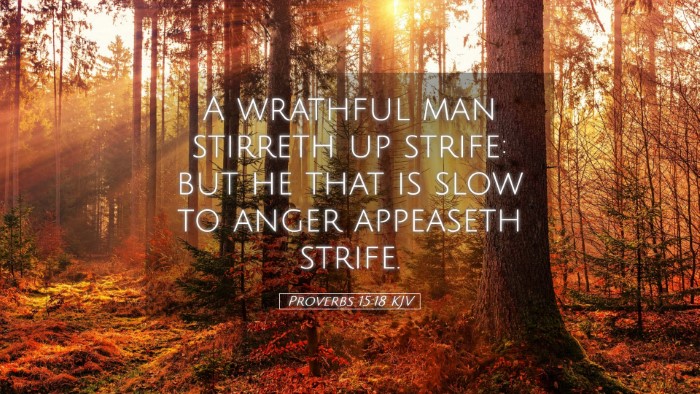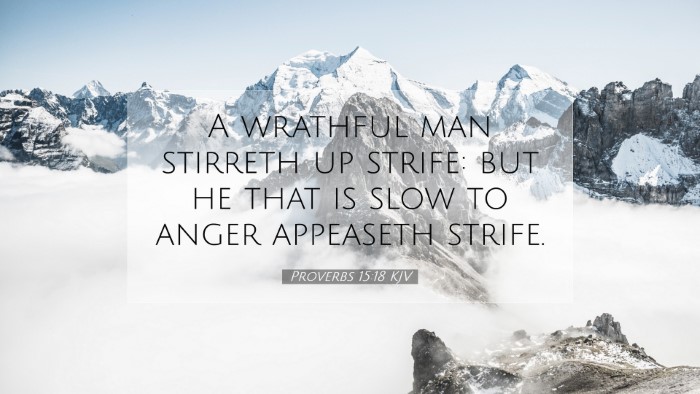Commentary on Proverbs 15:18
Proverbs 15:18 states: "A wrathful man stirs up strife: but he that is slow to anger appeases strife." This verse highlights the profound implications of one's temperament and the way it influences interpersonal relationships. The wisdom embedded in this proverb serves as a guide for both personal conduct and community living.
Contextual Understanding
To fully grasp the meaning of this verse, it is essential to understand the broader context of the book of Proverbs. This book, attributed largely to Solomon, offers insights into wisdom, folly, morality, and the dynamics of human relationships. Much like other proverbs, 15:18 reflects practical advice drawn from ancient wisdom that remains applicable in various social contexts today.
Insights from Commentaries
Matthew Henry
Matthew Henry emphasizes the contrast between the wrathful man and the one who is slow to anger. He notes that a wrathful individual tends to kindle disputes and provoke others, creating an environment ripe for conflict. Henry writes, "The man of wrath is not only oftentimes out of his wits, but he is also out of his own interests, as he loses friends and opportunities." In contrast, the individual who is slow to anger is characterized as one who possesses wisdom and self-control, thereby diffusing tension and fostering peace. According to Henry, "he that is slow to anger has the most command of himself and his passions."
Albert Barnes
Albert Barnes brings forth a linguistic analysis of the Hebrew terms used in this verse. He highlights that the phrase "stirs up strife" can be understood as inciting discord among parties. Barnes elaborates that this behavior can manifest in various forms, such as quarrelsome speech or aggressive action, which disrupts harmony. Barnes states, "He who is prone to anger is disruptive and fuels conflict, while the one who is patient can often resolve it." He draws on the ancient contrasts in wisdom literature whereby those filled with anger are likened to a turbulent sea, whereas the patient person is like a calm harbor.
Adam Clarke
Adam Clarke approaches Proverbs 15:18 with pastoral sensitivity, exploring the emotional and spiritual implications of anger. He notes that anger, when left unchecked, can lead to sin and further conflict, as echoed in Ephesians 4:26. Clarke states, "Anger is a brief madness; it blinds the mind and darkens understanding." He encourages a tempered spirit, elaborating that the ability to restrain one’s anger not only reflects maturity but is essential in fostering reconciliation. Furthermore, he comments on the importance of seeking peace, as the wise person strives to maintain harmony in both personal and communal spheres.
Theological Implications
This verse goes beyond mere advice on temperance; it encapsulates key theological principles related to the nature of God and human relationships. In understanding God’s character, we find a model for our behavior. God demonstrates patience and slow anger, as noted throughout scriptures (e.g., Exodus 34:6). The call to imitate such divine attributes strengthens communal ties and reflects one’s spiritual maturity.
Practical Applications
1. Self-Reflection
Believers are encouraged to regularly assess their reactions to provocation. Considering whether one's first instinct is to respond with wrath or to seek peaceful resolution is critical for personal growth and spiritual health.
2. Conflict Resolution
In a pastoral context, this verse serves as foundational in teaching conflict resolution techniques. Pastors and church leaders can leverage this wisdom to equip congregants with skills to manage disagreements without escalating tensions.
3. Community Building
A commitment to being slow to anger facilitates community bonds. In diverse congregations, where differences can lead to conflict, promoting patience and understanding is paramount to building a healthy and vibrant community.
Conclusion
Proverbs 15:18 instructs us about the profound impact of our emotional responses. By cultivating patience and self-control, we can act as agents of peace, reflecting the character of God in our dealings with others. The insights provided by commentators Matthew Henry, Albert Barnes, and Adam Clarke illuminate this theme and offer practical guidance to those endeavoring to live out this wisdom in their daily lives. As we strive to be slow to anger, we not only work towards personal sanctification but also contribute to the peace and unity of our communities.


